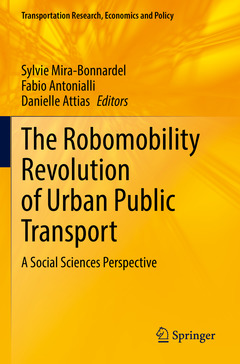The Robomobility Revolution of Urban Public Transport, 1st ed. 2021 A Social Sciences Perspective Transportation Research, Economics and Policy Series

Over the past two decades, society has been witnessing how technological, political, and societal changes have been transforming individual and collective urban mobility. Driven both by newcomers and traditional players, by disruptive as well as incremental innovations, the main objective now is to enhance mobility and accessibility while, reducing vehicle ownership, congestion, road accidents, and pollution in cities.
This transformation has been mainly enabled by the widespread adoption of internet-connected devices (e.g.: smartphones and tablets) and by the innovative business models, technologies, and use-cases that arose from this rapid digitalization, such as peer-to-peer, and two-sided markets providing several mobility schemes: car-sharing, car-pooling, bike sharing, free-floating (cars, bikes, electric scooter), ridesharing and ride hailing either for long distances as well as for urban and micro-mobility.
The book presents ? in a holistic perspective ? how this revolution is happening and what are the major cornerstones for the implementation of robomobility. It aims at answering several substantial issues, such as: What is robomobility and what does it imply for the different stakeholders of the public transport ecosystem? How do policy makers integrate this innovation and how ready the regulations are? How do citizens take part in this transformation? What is the level of user acceptance for this new type of mobility? What are its environmental impacts? What is the economic impact of deploying these shuttles in a local ecosystem?
Sylvie Mira Bonnardel is an Assistant Professor in Business Administration at École Centrale Lyon – Lyon University (France). Her research mainly deals with innovation strategy linked with networking process leading to open innovation and entrepreneurial dynamics. She has addressed different mobility issues, developing an expertise on new forms of mobility, in particular robomobility. She teaches Strategic Management and Corporate Finance.
Fabio Antonialli is a Researcher/Lecturer in Business Administration at École Centrale Lyon – Lyon University (France). His research interests include business models and business platforms for autonomous vehicles, urban mobility, productive chains, consumer behavior, organizational networks and innovation. He has experience in general administration, human resources, business strategies, marketing, logistics. He teaches Strategic Management, Marketing and Project Management.
Danielle Attias is an Emeritus Professor in Economics and Management at École CentraleSupélec CentraleSupélec – Paris-Saclay University (France). Passionate about innovation and mobility, Dr. Danielle Attias managed a prospective research chair on electromobility in partnership with Peugeot-Citroën. She participated in an expert commission on mobility within the O.P.E.S.CT. (Parliamentary Office for the Evaluation of Scientific and Technological Choices). She is currently supervising the AVENUE project on the deployment of autonomous shuttles in urban centers.
Analyses the current situation with automation for public transport as well as offering a prospective vision of this market
Includes real case studies and analytical tools and frameworks
Brings relevant insights from an academic, as well as an empirical, standpoint
Date de parution : 09-2022
Ouvrage de 218 p.
15.5x23.5 cm
Disponible chez l'éditeur (délai d'approvisionnement : 15 jours).
Prix indicatif 137,14 €
Ajouter au panierDate de parution : 09-2021
Ouvrage de 218 p.
15.5x23.5 cm
